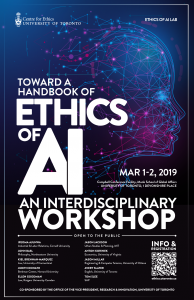
What has been left behind in the global rush to put the science of AI to work is the ethics of AI. We need to work together, within the university and beyond, to lay the groundwork for closing the gap between AI science and ethics, locally, nationally, and globally. Tackling the complex challenge of the ethics of AI requires an all-hands-on-deck effort that draws on the combined brain power and analytic tools of a global community of experts and scholars from a wide range of disciplines and backgrounds.
To help facilitate the much needed broadly-framed conversation about the ethics of AI, the Centre for Ethics launched Ethics of AI Lab, beginning with an interdisciplinary workshop series and a cross-divisional graduate course. Relatedly, the Oxford Handbook of Ethics of AI (forthcoming in early 2020) aims to lay the foundation for the emerging field of Ethics of AI as an inclusive and diverse enterprise. Edited by two Ethics of AI Lab members (Markus Dubber, Sunit Das) and a leading scholar in the field (Frank Pasquale, University of Maryland), the Handbook will be an interdisciplinary and international collection designed to capture and shape research and reflection on normative frameworks for the production, application, and use of artificial intelligence in all spheres of individual, commercial, social, and public life. The Handbook’s underlying conception of its subject matter will be reflected in its roster of contributors, which will include some fifty authors from several continents, ranging from current to future research leaders and representing a variety of methodological approaches, areas of expertise, and research agendas. Its content will be similarly wide and diverse in scope and substance, covering a range of perspectives, topics, and applications.
The workshop on March 1-2, 2019, brought together selected Handbook contributors to present and discuss their work-in-progress:
Friday, March 1
9-10 Judith Donath, Berkman Center, Harvard University: “Ethics of AI in Context: Society & Culture” Video: Judith Donath, Artificial Entities | Audio (SoundCloud)
10-11 Tom Slee, SAP: “Private Sector AI: Ethics and Incentives” Video: Tom Slee, Private Sector AI: Ethics and Incentives | Audio (SoundCloud)
11-12 John Basl, Philosophy, Northeastern University: “The Rights of Artificial Intelligences” Video: John Basl, AI Rights | Audio (SoundCloud)
12-1 Jason Millar, Engineering & Computer Science, University of Ottawa: “Perspectives on Ethics of AI: Engineering” Video: Jason Millar, Social Failure Modes in Technology – Implications for AI | Audio (SoundCloud)
1-2 Break
2-3 Anton Korinek, Economics, University of Virginia: “Perspectives on Ethics of AI: Economics” Video: Anton Korinek, Economic and Ethical Perspectives on the Rise of Artificial Intelligence | Audio (SoundCloud)
3-4 Avery Slater, English, University of Toronto: “Automating Origination: Perspectives from the Humanities” Video: Avery Slater, Computation and Creativity | Audio (SoundCloud)
4-5 Jason Jackson, Urban Studies & Planning, MIT: “Perspectives on Ethics of AI: Political Economy” Video: Jason Jackson, The Ethics of AI: A Political Economy Approach | Audio (SoundCloud)
Saturday, March 2
9-10 Kiel Brennan-Marquez, Law, University of Connecticut: “Public Law & Policy: Notice, Predictability, and Due Process” Video: Kiel Brennan-Marquez, Kiel Brennan-Marquez, “Fair Notice” in the Age of Big Data | Audio (SoundCloud)
10-11 Ellen Goodman, Law, Rutgers University-Camden: “Smart City Ethics” Video: Ellen P. Goodman, Smart City Ethics | Audio (SoundCloud)
The video symposium of the event is available here; all audio recordings are accessible here.
The event was co-sponsored by the Office of the Vice-President, Research & Innovation, University of Toronto
Fri, Mar 1, 2019
12:00 AM - 11:59 PM
Vivian and David Campbell Conference Facility
1 Devonshire Place
